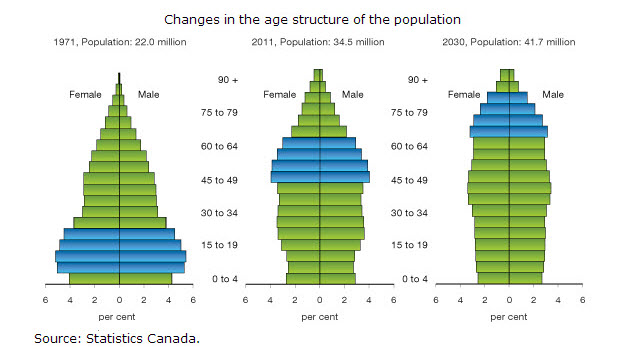Angie Oshika
Other


Imagine a flood of houses suddenly listed for sale across Canada, overwhelming supply and causing prices to drop dramatically. That’s the nightmare scenario that some real estate analysts predict. And the source of this sudden flood? The generation of Canadians known as the Baby Boomers reaching retirement and downsizing.
The Boomers make up almost one-third of our population (29%), and as they’ve moved from one life stage to the next, their needs have always shifted our society. So should we fear that this time they’ll topple the entire real estate market and ruin the financial future of the generations that follow?
Probably not.
Recent studies by the Conference Board of Canada and Royal LePage suggest that the situation isn’t as clear cut as the demographic charts might make us think.
Boomers don’t always follow the path of previous generations. They’re approaching retirement with more ambition, better health, and more affluence. In fact, the Royal LePage study reports that nearly half (43.5%) of Boomers who plan to move intend to find a new home that is the same size or bigger than their current one. Phil Soper, Chief Executive Officer of Royal LePage Real Estate said, “Baby Boomers are the wealthiest generation in Canadian history. They live in large homes with ample space for their many possessions. They love their garages and their yards.”
Adult children are staying at home longer, too – as many as 33.4 percent in some provinces. Soper explains, “The adult children of Baby Boomers aren’t going anywhere fast. Good jobs have proven more difficult for them to find, they’re extending their studies and they’re living at home. It is no wonder the concept of swapping a family-sized home for a small retreat has lost its lustre.”
When Boomers do start to move to smaller dwellings, will there then be an absence of interested buyers for multi-story houses? It doesn’t look that way.
The children of the Boomers, known as Generation Y, are a substantial subset (27.3%) of the population themselves. As they settle and start families, the perceived safety and comfort of the multi-story homes in the suburbs is appealing and familiar. The study is clear, Soper explains: “… the study results do not point to a … decrease in demand for traditional single-family homes. For the Baby Boomers that do head downtown, there is a generation waiting to move in.”
Another factor is international immigration: new Canadians will also be looking for safe neighbourhoods with parks and schools nearby. In addition to this increase in demand, construction of new single-family homes is expected to decrease, and some of the existing houses will be converted into multiple-unit dwellings. Single-family houses will become somewhat rarer.
As we can see, the formula isn’t as simple as predicting what the aging Boomer generation will do. The market for smaller homes is just as complex. The Conference Board of Canada study points out that a percentage of Boomers will downsize, thereby increasing the market for condominiums and townhomes. One-person households are growing as well, because of more divorces and fewer couples and families being formed. That adds to the demand for multifamily units, particularly in urban centres.
But both studies agree that a wide range of market and demographic factors will contribute to keeping our real estate market cushioned and homes of all sizes selling as the Boomers settle into retirement.
© 2013 Real Estate Weekly

